Investigating Generational Differences in Self-Entitlement Levels
VerifiedAdded on 2022/08/18
|17
|3681
|10
Report
AI Summary
This report presents a study investigating the differences in self-entitlement, narcissism, and hypertensive narcissism across three generations: Baby Boomers, Generation X, and Millennials. The research utilized questionnaires to collect data and employed Pearson correlations, ANOVAs, and post-hoc analyses to examine relationships and differences. Findings revealed no significant relationship between birth year (generation) and self-entitlement, but a significant correlation between birth year and both narcissism and hypertensive narcissism. While no significant difference in average narcissism or self-entitlement was found across generations, a significant difference in hypertensive narcissism was observed, with Millennials exhibiting higher levels. The study aligns with literature suggesting potential generational biases and highlights the role of social media and technological advancements in shaping self-perception. The report includes detailed methodology, results, and discussion of the implications of the findings, providing valuable insights into generational attitudes and psychological traits.
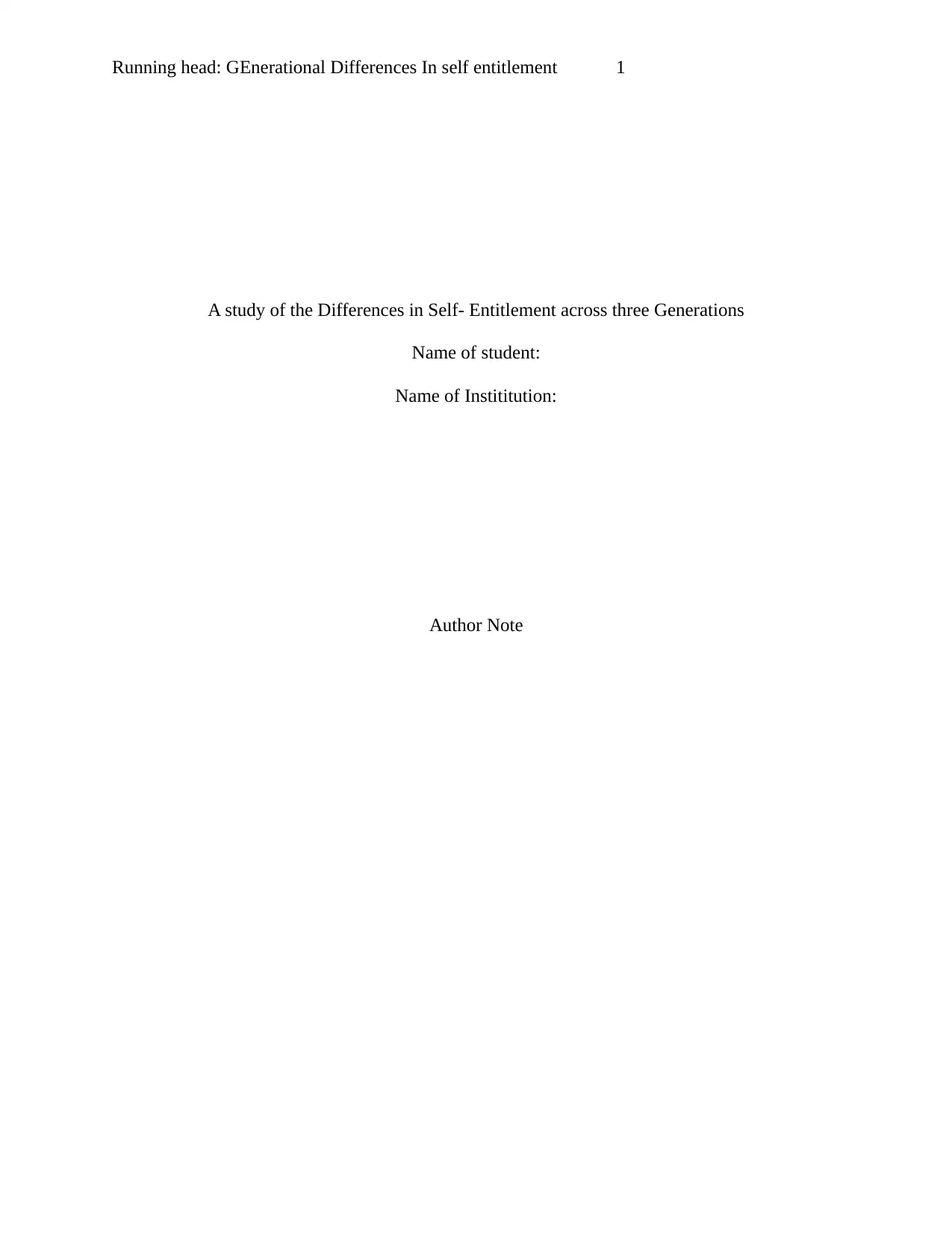
Running head: GEnerational Differences In self entitlement 1
A study of the Differences in Self- Entitlement across three Generations
Name of student:
Name of Instititution:
Author Note
A study of the Differences in Self- Entitlement across three Generations
Name of student:
Name of Instititution:
Author Note
Paraphrase This Document
Need a fresh take? Get an instant paraphrase of this document with our AI Paraphraser
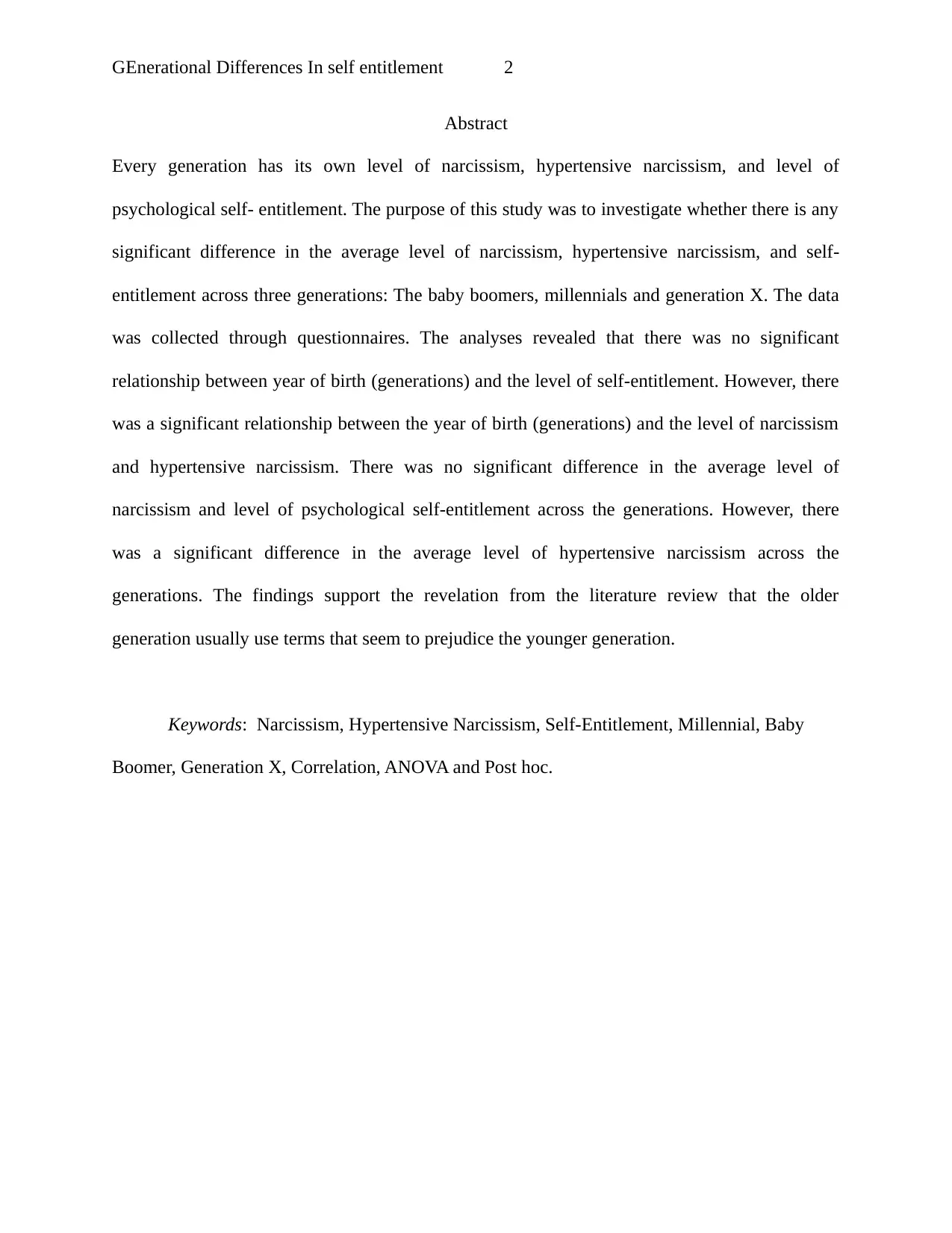
GEnerational Differences In self entitlement 2
Abstract
Every generation has its own level of narcissism, hypertensive narcissism, and level of
psychological self- entitlement. The purpose of this study was to investigate whether there is any
significant difference in the average level of narcissism, hypertensive narcissism, and self-
entitlement across three generations: The baby boomers, millennials and generation X. The data
was collected through questionnaires. The analyses revealed that there was no significant
relationship between year of birth (generations) and the level of self-entitlement. However, there
was a significant relationship between the year of birth (generations) and the level of narcissism
and hypertensive narcissism. There was no significant difference in the average level of
narcissism and level of psychological self-entitlement across the generations. However, there
was a significant difference in the average level of hypertensive narcissism across the
generations. The findings support the revelation from the literature review that the older
generation usually use terms that seem to prejudice the younger generation.
Keywords: Narcissism, Hypertensive Narcissism, Self-Entitlement, Millennial, Baby
Boomer, Generation X, Correlation, ANOVA and Post hoc.
Abstract
Every generation has its own level of narcissism, hypertensive narcissism, and level of
psychological self- entitlement. The purpose of this study was to investigate whether there is any
significant difference in the average level of narcissism, hypertensive narcissism, and self-
entitlement across three generations: The baby boomers, millennials and generation X. The data
was collected through questionnaires. The analyses revealed that there was no significant
relationship between year of birth (generations) and the level of self-entitlement. However, there
was a significant relationship between the year of birth (generations) and the level of narcissism
and hypertensive narcissism. There was no significant difference in the average level of
narcissism and level of psychological self-entitlement across the generations. However, there
was a significant difference in the average level of hypertensive narcissism across the
generations. The findings support the revelation from the literature review that the older
generation usually use terms that seem to prejudice the younger generation.
Keywords: Narcissism, Hypertensive Narcissism, Self-Entitlement, Millennial, Baby
Boomer, Generation X, Correlation, ANOVA and Post hoc.
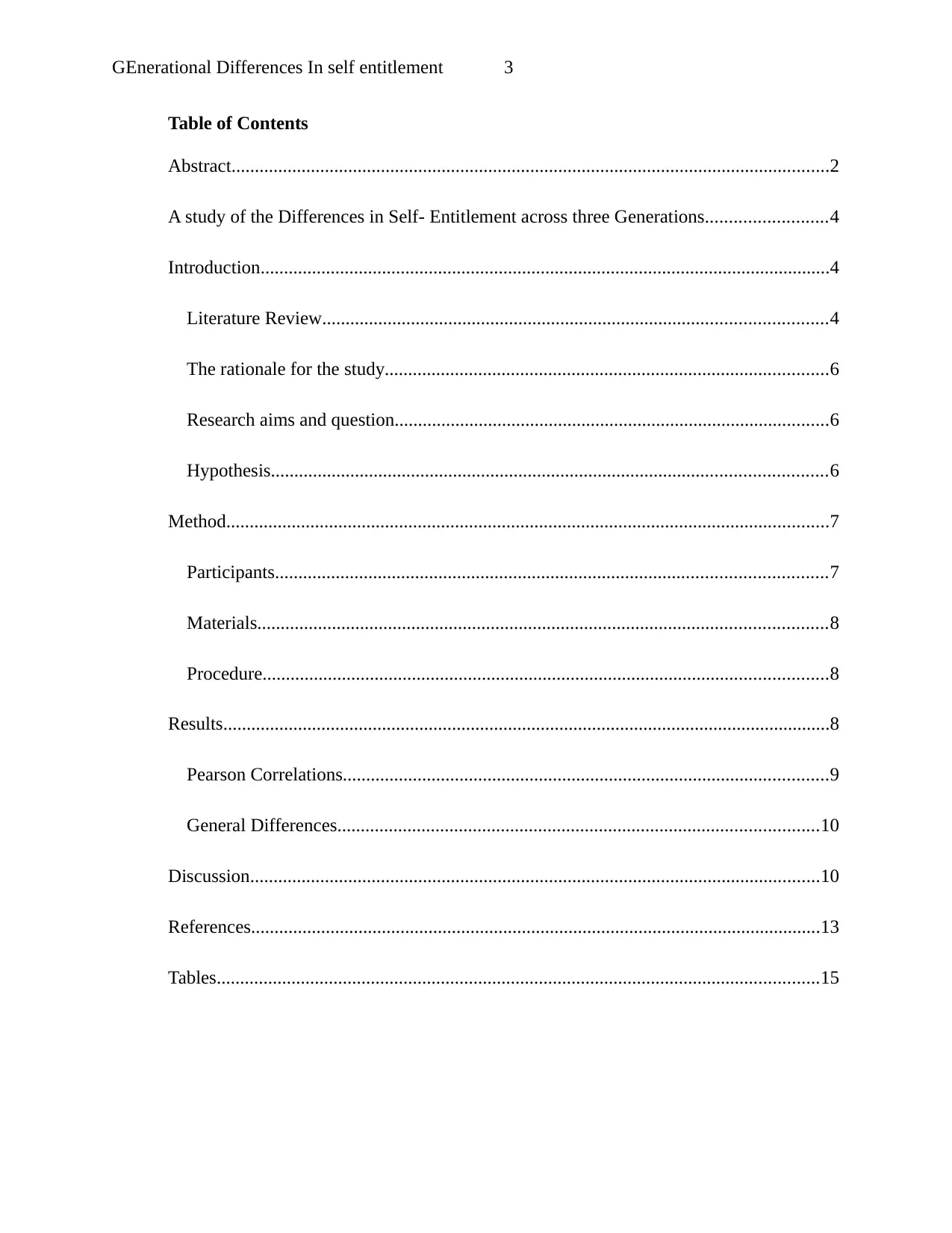
GEnerational Differences In self entitlement 3
Table of Contents
Abstract................................................................................................................................2
A study of the Differences in Self- Entitlement across three Generations..........................4
Introduction..........................................................................................................................4
Literature Review............................................................................................................4
The rationale for the study...............................................................................................6
Research aims and question.............................................................................................6
Hypothesis.......................................................................................................................6
Method.................................................................................................................................7
Participants......................................................................................................................7
Materials..........................................................................................................................8
Procedure.........................................................................................................................8
Results..................................................................................................................................8
Pearson Correlations........................................................................................................9
General Differences.......................................................................................................10
Discussion..........................................................................................................................10
References..........................................................................................................................13
Tables.................................................................................................................................15
Table of Contents
Abstract................................................................................................................................2
A study of the Differences in Self- Entitlement across three Generations..........................4
Introduction..........................................................................................................................4
Literature Review............................................................................................................4
The rationale for the study...............................................................................................6
Research aims and question.............................................................................................6
Hypothesis.......................................................................................................................6
Method.................................................................................................................................7
Participants......................................................................................................................7
Materials..........................................................................................................................8
Procedure.........................................................................................................................8
Results..................................................................................................................................8
Pearson Correlations........................................................................................................9
General Differences.......................................................................................................10
Discussion..........................................................................................................................10
References..........................................................................................................................13
Tables.................................................................................................................................15
⊘ This is a preview!⊘
Do you want full access?
Subscribe today to unlock all pages.

Trusted by 1+ million students worldwide
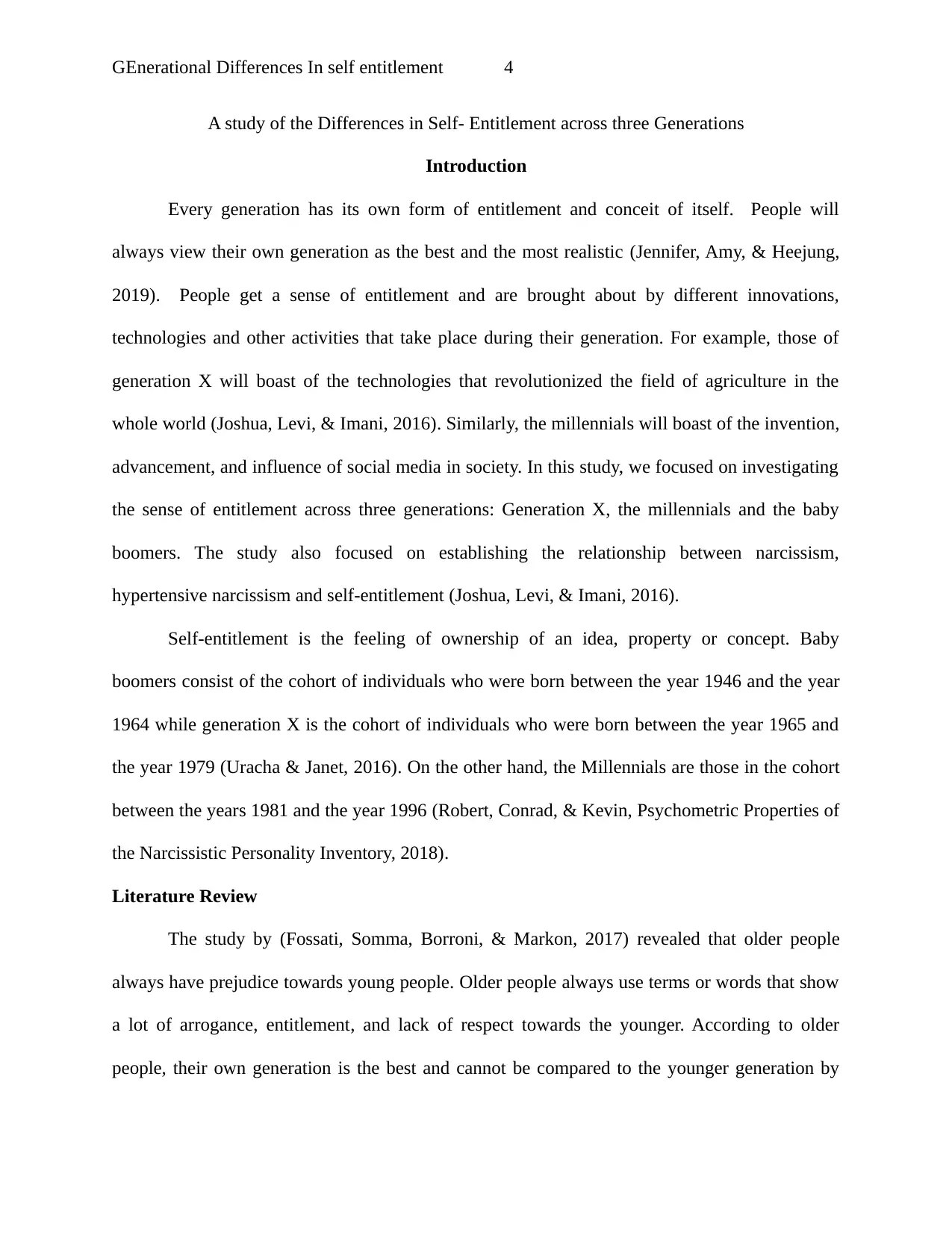
GEnerational Differences In self entitlement 4
A study of the Differences in Self- Entitlement across three Generations
Introduction
Every generation has its own form of entitlement and conceit of itself. People will
always view their own generation as the best and the most realistic (Jennifer, Amy, & Heejung,
2019). People get a sense of entitlement and are brought about by different innovations,
technologies and other activities that take place during their generation. For example, those of
generation X will boast of the technologies that revolutionized the field of agriculture in the
whole world (Joshua, Levi, & Imani, 2016). Similarly, the millennials will boast of the invention,
advancement, and influence of social media in society. In this study, we focused on investigating
the sense of entitlement across three generations: Generation X, the millennials and the baby
boomers. The study also focused on establishing the relationship between narcissism,
hypertensive narcissism and self-entitlement (Joshua, Levi, & Imani, 2016).
Self-entitlement is the feeling of ownership of an idea, property or concept. Baby
boomers consist of the cohort of individuals who were born between the year 1946 and the year
1964 while generation X is the cohort of individuals who were born between the year 1965 and
the year 1979 (Uracha & Janet, 2016). On the other hand, the Millennials are those in the cohort
between the years 1981 and the year 1996 (Robert, Conrad, & Kevin, Psychometric Properties of
the Narcissistic Personality Inventory, 2018).
Literature Review
The study by (Fossati, Somma, Borroni, & Markon, 2017) revealed that older people
always have prejudice towards young people. Older people always use terms or words that show
a lot of arrogance, entitlement, and lack of respect towards the younger. According to older
people, their own generation is the best and cannot be compared to the younger generation by
A study of the Differences in Self- Entitlement across three Generations
Introduction
Every generation has its own form of entitlement and conceit of itself. People will
always view their own generation as the best and the most realistic (Jennifer, Amy, & Heejung,
2019). People get a sense of entitlement and are brought about by different innovations,
technologies and other activities that take place during their generation. For example, those of
generation X will boast of the technologies that revolutionized the field of agriculture in the
whole world (Joshua, Levi, & Imani, 2016). Similarly, the millennials will boast of the invention,
advancement, and influence of social media in society. In this study, we focused on investigating
the sense of entitlement across three generations: Generation X, the millennials and the baby
boomers. The study also focused on establishing the relationship between narcissism,
hypertensive narcissism and self-entitlement (Joshua, Levi, & Imani, 2016).
Self-entitlement is the feeling of ownership of an idea, property or concept. Baby
boomers consist of the cohort of individuals who were born between the year 1946 and the year
1964 while generation X is the cohort of individuals who were born between the year 1965 and
the year 1979 (Uracha & Janet, 2016). On the other hand, the Millennials are those in the cohort
between the years 1981 and the year 1996 (Robert, Conrad, & Kevin, Psychometric Properties of
the Narcissistic Personality Inventory, 2018).
Literature Review
The study by (Fossati, Somma, Borroni, & Markon, 2017) revealed that older people
always have prejudice towards young people. Older people always use terms or words that show
a lot of arrogance, entitlement, and lack of respect towards the younger. According to older
people, their own generation is the best and cannot be compared to the younger generation by
Paraphrase This Document
Need a fresh take? Get an instant paraphrase of this document with our AI Paraphraser
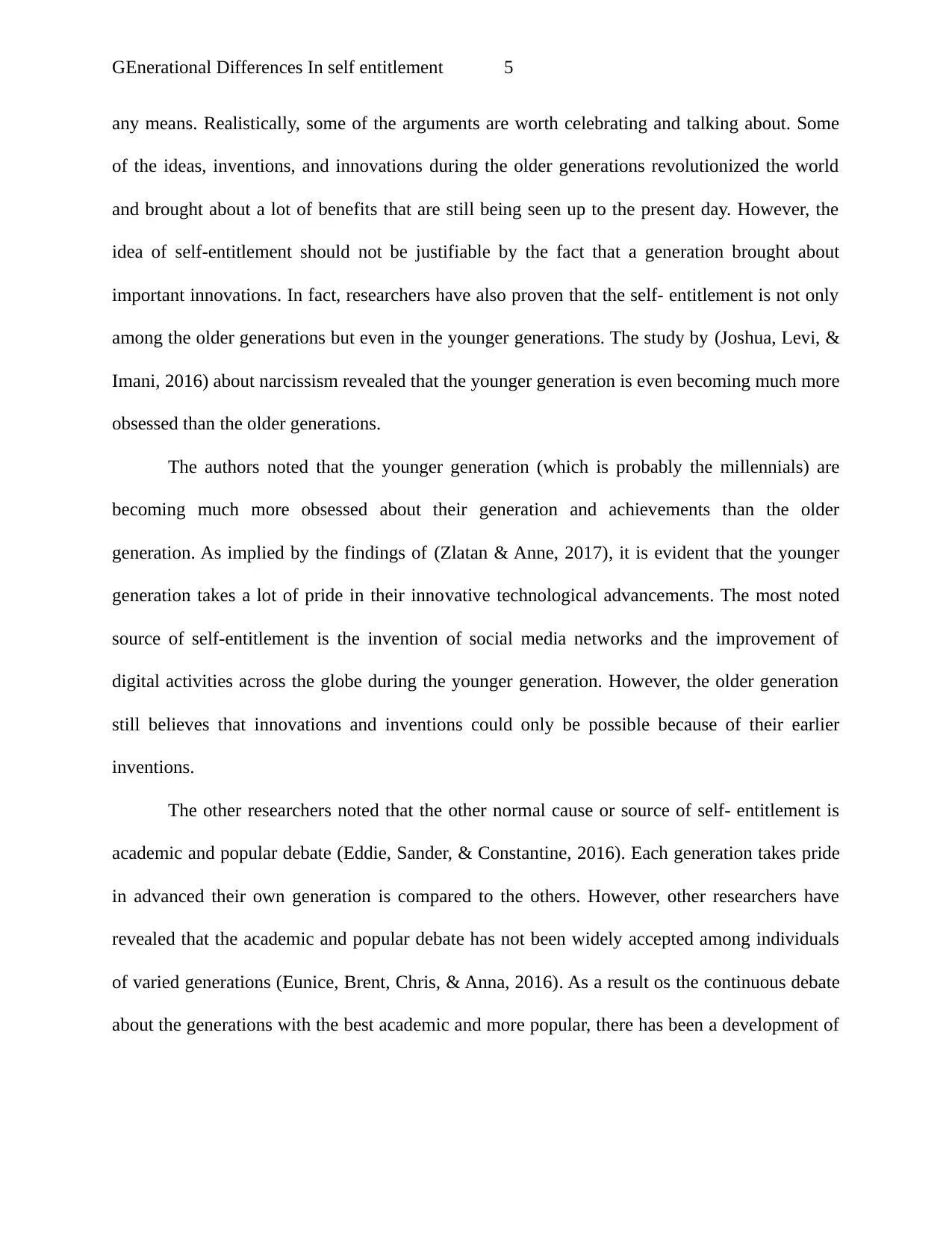
GEnerational Differences In self entitlement 5
any means. Realistically, some of the arguments are worth celebrating and talking about. Some
of the ideas, inventions, and innovations during the older generations revolutionized the world
and brought about a lot of benefits that are still being seen up to the present day. However, the
idea of self-entitlement should not be justifiable by the fact that a generation brought about
important innovations. In fact, researchers have also proven that the self- entitlement is not only
among the older generations but even in the younger generations. The study by (Joshua, Levi, &
Imani, 2016) about narcissism revealed that the younger generation is even becoming much more
obsessed than the older generations.
The authors noted that the younger generation (which is probably the millennials) are
becoming much more obsessed about their generation and achievements than the older
generation. As implied by the findings of (Zlatan & Anne, 2017), it is evident that the younger
generation takes a lot of pride in their innovative technological advancements. The most noted
source of self-entitlement is the invention of social media networks and the improvement of
digital activities across the globe during the younger generation. However, the older generation
still believes that innovations and inventions could only be possible because of their earlier
inventions.
The other researchers noted that the other normal cause or source of self- entitlement is
academic and popular debate (Eddie, Sander, & Constantine, 2016). Each generation takes pride
in advanced their own generation is compared to the others. However, other researchers have
revealed that the academic and popular debate has not been widely accepted among individuals
of varied generations (Eunice, Brent, Chris, & Anna, 2016). As a result os the continuous debate
about the generations with the best academic and more popular, there has been a development of
any means. Realistically, some of the arguments are worth celebrating and talking about. Some
of the ideas, inventions, and innovations during the older generations revolutionized the world
and brought about a lot of benefits that are still being seen up to the present day. However, the
idea of self-entitlement should not be justifiable by the fact that a generation brought about
important innovations. In fact, researchers have also proven that the self- entitlement is not only
among the older generations but even in the younger generations. The study by (Joshua, Levi, &
Imani, 2016) about narcissism revealed that the younger generation is even becoming much more
obsessed than the older generations.
The authors noted that the younger generation (which is probably the millennials) are
becoming much more obsessed about their generation and achievements than the older
generation. As implied by the findings of (Zlatan & Anne, 2017), it is evident that the younger
generation takes a lot of pride in their innovative technological advancements. The most noted
source of self-entitlement is the invention of social media networks and the improvement of
digital activities across the globe during the younger generation. However, the older generation
still believes that innovations and inventions could only be possible because of their earlier
inventions.
The other researchers noted that the other normal cause or source of self- entitlement is
academic and popular debate (Eddie, Sander, & Constantine, 2016). Each generation takes pride
in advanced their own generation is compared to the others. However, other researchers have
revealed that the academic and popular debate has not been widely accepted among individuals
of varied generations (Eunice, Brent, Chris, & Anna, 2016). As a result os the continuous debate
about the generations with the best academic and more popular, there has been a development of
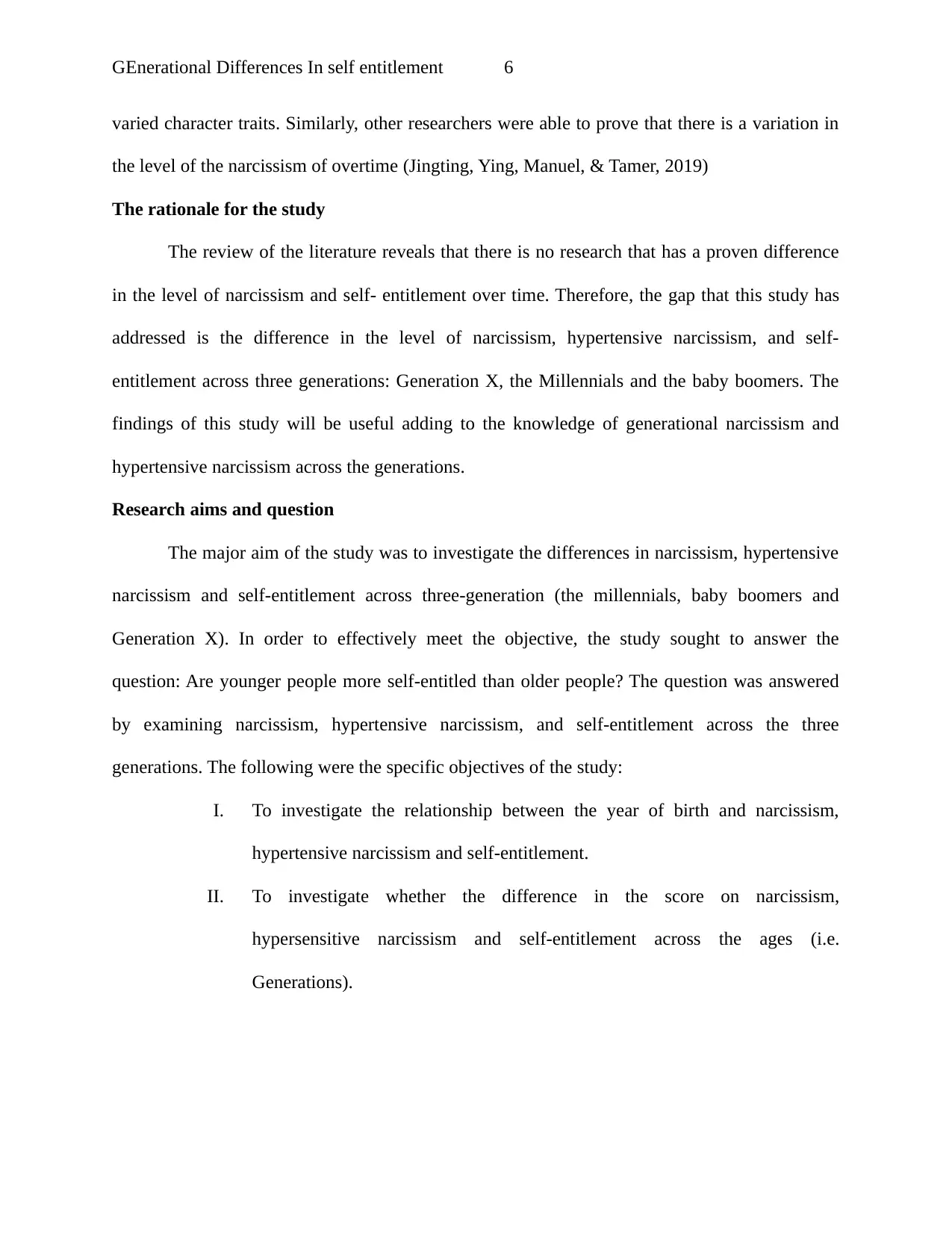
GEnerational Differences In self entitlement 6
varied character traits. Similarly, other researchers were able to prove that there is a variation in
the level of the narcissism of overtime (Jingting, Ying, Manuel, & Tamer, 2019)
The rationale for the study
The review of the literature reveals that there is no research that has a proven difference
in the level of narcissism and self- entitlement over time. Therefore, the gap that this study has
addressed is the difference in the level of narcissism, hypertensive narcissism, and self-
entitlement across three generations: Generation X, the Millennials and the baby boomers. The
findings of this study will be useful adding to the knowledge of generational narcissism and
hypertensive narcissism across the generations.
Research aims and question
The major aim of the study was to investigate the differences in narcissism, hypertensive
narcissism and self-entitlement across three-generation (the millennials, baby boomers and
Generation X). In order to effectively meet the objective, the study sought to answer the
question: Are younger people more self-entitled than older people? The question was answered
by examining narcissism, hypertensive narcissism, and self-entitlement across the three
generations. The following were the specific objectives of the study:
I. To investigate the relationship between the year of birth and narcissism,
hypertensive narcissism and self-entitlement.
II. To investigate whether the difference in the score on narcissism,
hypersensitive narcissism and self-entitlement across the ages (i.e.
Generations).
varied character traits. Similarly, other researchers were able to prove that there is a variation in
the level of the narcissism of overtime (Jingting, Ying, Manuel, & Tamer, 2019)
The rationale for the study
The review of the literature reveals that there is no research that has a proven difference
in the level of narcissism and self- entitlement over time. Therefore, the gap that this study has
addressed is the difference in the level of narcissism, hypertensive narcissism, and self-
entitlement across three generations: Generation X, the Millennials and the baby boomers. The
findings of this study will be useful adding to the knowledge of generational narcissism and
hypertensive narcissism across the generations.
Research aims and question
The major aim of the study was to investigate the differences in narcissism, hypertensive
narcissism and self-entitlement across three-generation (the millennials, baby boomers and
Generation X). In order to effectively meet the objective, the study sought to answer the
question: Are younger people more self-entitled than older people? The question was answered
by examining narcissism, hypertensive narcissism, and self-entitlement across the three
generations. The following were the specific objectives of the study:
I. To investigate the relationship between the year of birth and narcissism,
hypertensive narcissism and self-entitlement.
II. To investigate whether the difference in the score on narcissism,
hypersensitive narcissism and self-entitlement across the ages (i.e.
Generations).
⊘ This is a preview!⊘
Do you want full access?
Subscribe today to unlock all pages.

Trusted by 1+ million students worldwide
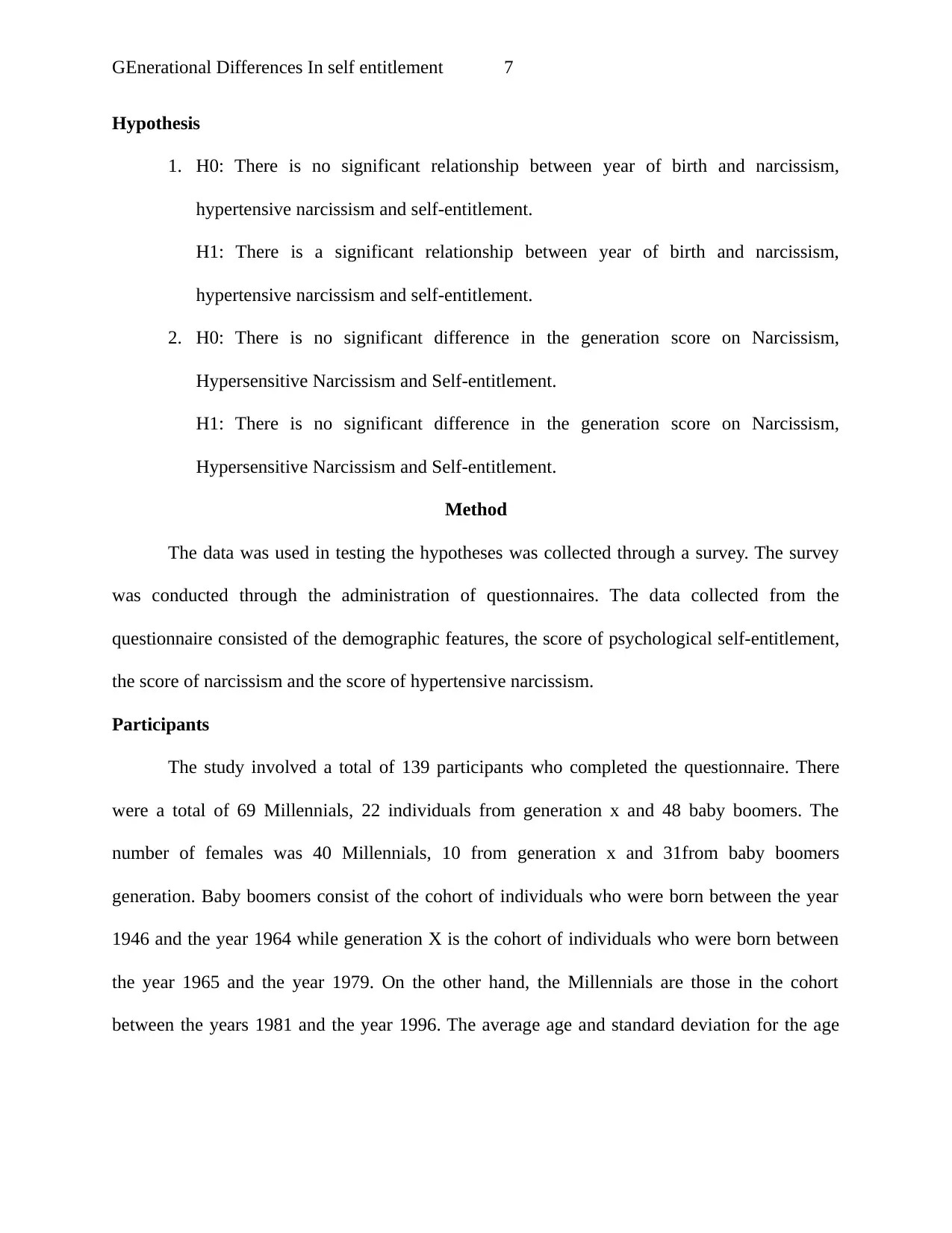
GEnerational Differences In self entitlement 7
Hypothesis
1. H0: There is no significant relationship between year of birth and narcissism,
hypertensive narcissism and self-entitlement.
H1: There is a significant relationship between year of birth and narcissism,
hypertensive narcissism and self-entitlement.
2. H0: There is no significant difference in the generation score on Narcissism,
Hypersensitive Narcissism and Self-entitlement.
H1: There is no significant difference in the generation score on Narcissism,
Hypersensitive Narcissism and Self-entitlement.
Method
The data was used in testing the hypotheses was collected through a survey. The survey
was conducted through the administration of questionnaires. The data collected from the
questionnaire consisted of the demographic features, the score of psychological self-entitlement,
the score of narcissism and the score of hypertensive narcissism.
Participants
The study involved a total of 139 participants who completed the questionnaire. There
were a total of 69 Millennials, 22 individuals from generation x and 48 baby boomers. The
number of females was 40 Millennials, 10 from generation x and 31from baby boomers
generation. Baby boomers consist of the cohort of individuals who were born between the year
1946 and the year 1964 while generation X is the cohort of individuals who were born between
the year 1965 and the year 1979. On the other hand, the Millennials are those in the cohort
between the years 1981 and the year 1996. The average age and standard deviation for the age
Hypothesis
1. H0: There is no significant relationship between year of birth and narcissism,
hypertensive narcissism and self-entitlement.
H1: There is a significant relationship between year of birth and narcissism,
hypertensive narcissism and self-entitlement.
2. H0: There is no significant difference in the generation score on Narcissism,
Hypersensitive Narcissism and Self-entitlement.
H1: There is no significant difference in the generation score on Narcissism,
Hypersensitive Narcissism and Self-entitlement.
Method
The data was used in testing the hypotheses was collected through a survey. The survey
was conducted through the administration of questionnaires. The data collected from the
questionnaire consisted of the demographic features, the score of psychological self-entitlement,
the score of narcissism and the score of hypertensive narcissism.
Participants
The study involved a total of 139 participants who completed the questionnaire. There
were a total of 69 Millennials, 22 individuals from generation x and 48 baby boomers. The
number of females was 40 Millennials, 10 from generation x and 31from baby boomers
generation. Baby boomers consist of the cohort of individuals who were born between the year
1946 and the year 1964 while generation X is the cohort of individuals who were born between
the year 1965 and the year 1979. On the other hand, the Millennials are those in the cohort
between the years 1981 and the year 1996. The average age and standard deviation for the age
Paraphrase This Document
Need a fresh take? Get an instant paraphrase of this document with our AI Paraphraser
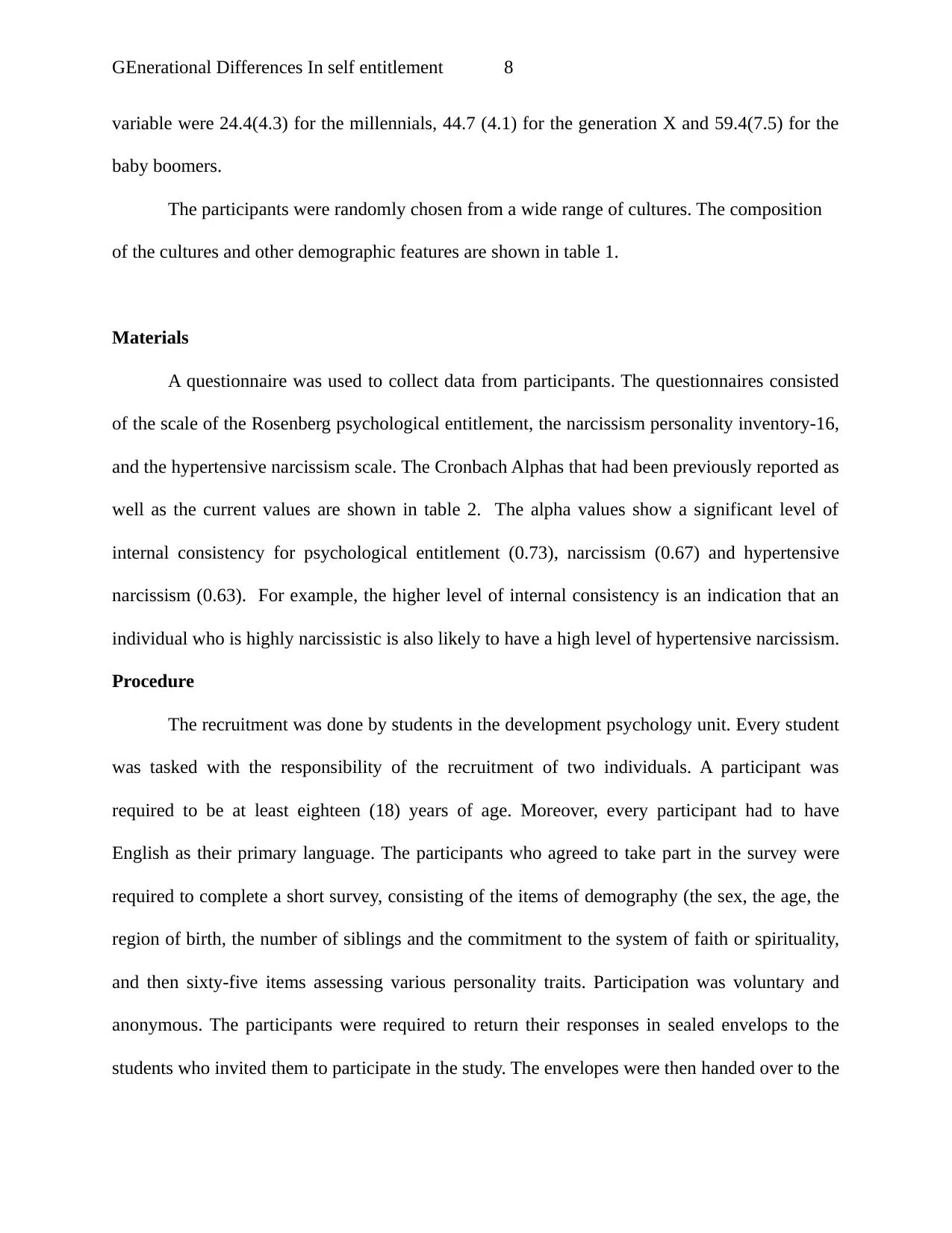
GEnerational Differences In self entitlement 8
variable were 24.4(4.3) for the millennials, 44.7 (4.1) for the generation X and 59.4(7.5) for the
baby boomers.
The participants were randomly chosen from a wide range of cultures. The composition
of the cultures and other demographic features are shown in table 1.
Materials
A questionnaire was used to collect data from participants. The questionnaires consisted
of the scale of the Rosenberg psychological entitlement, the narcissism personality inventory-16,
and the hypertensive narcissism scale. The Cronbach Alphas that had been previously reported as
well as the current values are shown in table 2. The alpha values show a significant level of
internal consistency for psychological entitlement (0.73), narcissism (0.67) and hypertensive
narcissism (0.63). For example, the higher level of internal consistency is an indication that an
individual who is highly narcissistic is also likely to have a high level of hypertensive narcissism.
Procedure
The recruitment was done by students in the development psychology unit. Every student
was tasked with the responsibility of the recruitment of two individuals. A participant was
required to be at least eighteen (18) years of age. Moreover, every participant had to have
English as their primary language. The participants who agreed to take part in the survey were
required to complete a short survey, consisting of the items of demography (the sex, the age, the
region of birth, the number of siblings and the commitment to the system of faith or spirituality,
and then sixty-five items assessing various personality traits. Participation was voluntary and
anonymous. The participants were required to return their responses in sealed envelops to the
students who invited them to participate in the study. The envelopes were then handed over to the
variable were 24.4(4.3) for the millennials, 44.7 (4.1) for the generation X and 59.4(7.5) for the
baby boomers.
The participants were randomly chosen from a wide range of cultures. The composition
of the cultures and other demographic features are shown in table 1.
Materials
A questionnaire was used to collect data from participants. The questionnaires consisted
of the scale of the Rosenberg psychological entitlement, the narcissism personality inventory-16,
and the hypertensive narcissism scale. The Cronbach Alphas that had been previously reported as
well as the current values are shown in table 2. The alpha values show a significant level of
internal consistency for psychological entitlement (0.73), narcissism (0.67) and hypertensive
narcissism (0.63). For example, the higher level of internal consistency is an indication that an
individual who is highly narcissistic is also likely to have a high level of hypertensive narcissism.
Procedure
The recruitment was done by students in the development psychology unit. Every student
was tasked with the responsibility of the recruitment of two individuals. A participant was
required to be at least eighteen (18) years of age. Moreover, every participant had to have
English as their primary language. The participants who agreed to take part in the survey were
required to complete a short survey, consisting of the items of demography (the sex, the age, the
region of birth, the number of siblings and the commitment to the system of faith or spirituality,
and then sixty-five items assessing various personality traits. Participation was voluntary and
anonymous. The participants were required to return their responses in sealed envelops to the
students who invited them to participate in the study. The envelopes were then handed over to the
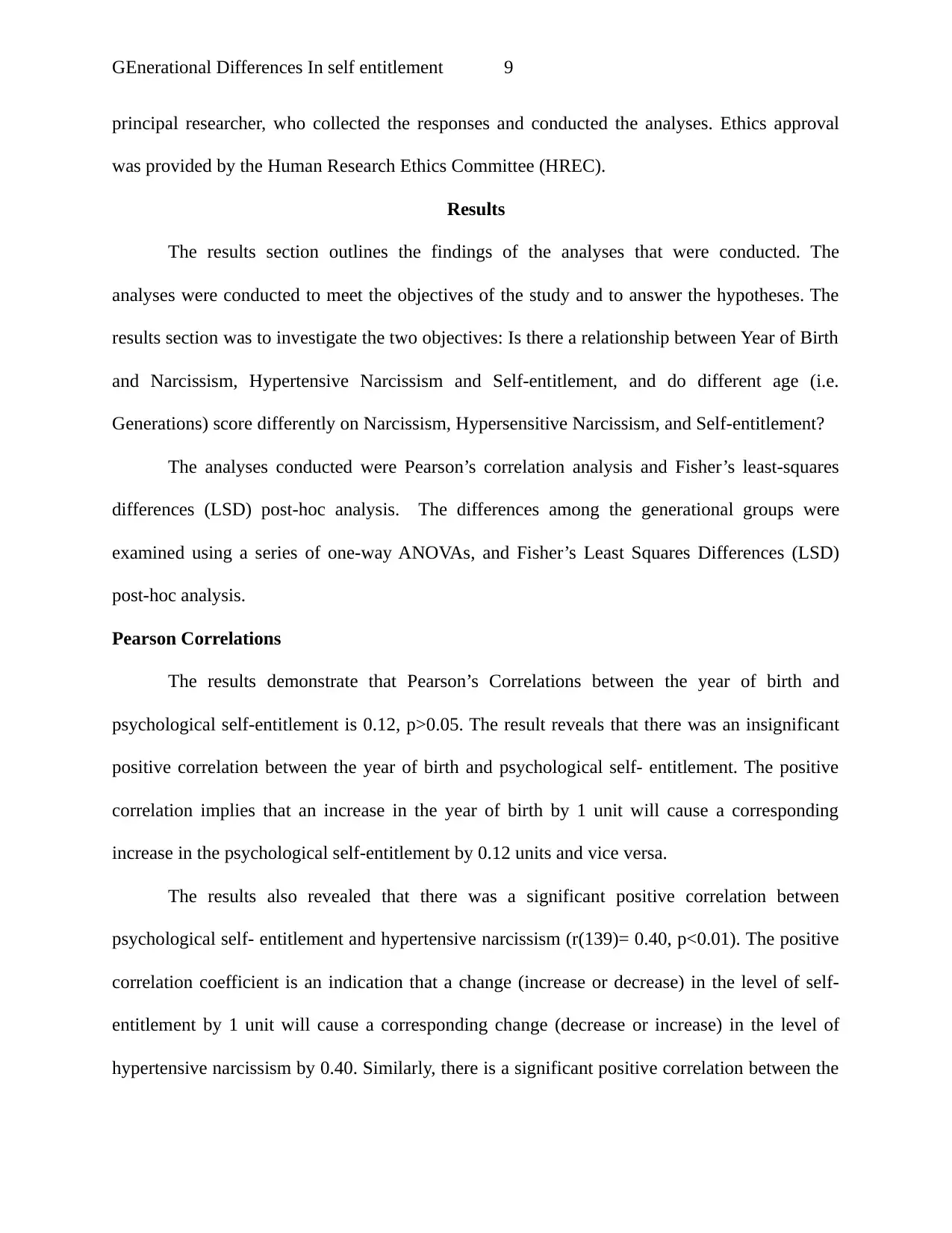
GEnerational Differences In self entitlement 9
principal researcher, who collected the responses and conducted the analyses. Ethics approval
was provided by the Human Research Ethics Committee (HREC).
Results
The results section outlines the findings of the analyses that were conducted. The
analyses were conducted to meet the objectives of the study and to answer the hypotheses. The
results section was to investigate the two objectives: Is there a relationship between Year of Birth
and Narcissism, Hypertensive Narcissism and Self-entitlement, and do different age (i.e.
Generations) score differently on Narcissism, Hypersensitive Narcissism, and Self-entitlement?
The analyses conducted were Pearson’s correlation analysis and Fisher’s least-squares
differences (LSD) post-hoc analysis. The differences among the generational groups were
examined using a series of one-way ANOVAs, and Fisher’s Least Squares Differences (LSD)
post-hoc analysis.
Pearson Correlations
The results demonstrate that Pearson’s Correlations between the year of birth and
psychological self-entitlement is 0.12, p>0.05. The result reveals that there was an insignificant
positive correlation between the year of birth and psychological self- entitlement. The positive
correlation implies that an increase in the year of birth by 1 unit will cause a corresponding
increase in the psychological self-entitlement by 0.12 units and vice versa.
The results also revealed that there was a significant positive correlation between
psychological self- entitlement and hypertensive narcissism (r(139)= 0.40, p<0.01). The positive
correlation coefficient is an indication that a change (increase or decrease) in the level of self-
entitlement by 1 unit will cause a corresponding change (decrease or increase) in the level of
hypertensive narcissism by 0.40. Similarly, there is a significant positive correlation between the
principal researcher, who collected the responses and conducted the analyses. Ethics approval
was provided by the Human Research Ethics Committee (HREC).
Results
The results section outlines the findings of the analyses that were conducted. The
analyses were conducted to meet the objectives of the study and to answer the hypotheses. The
results section was to investigate the two objectives: Is there a relationship between Year of Birth
and Narcissism, Hypertensive Narcissism and Self-entitlement, and do different age (i.e.
Generations) score differently on Narcissism, Hypersensitive Narcissism, and Self-entitlement?
The analyses conducted were Pearson’s correlation analysis and Fisher’s least-squares
differences (LSD) post-hoc analysis. The differences among the generational groups were
examined using a series of one-way ANOVAs, and Fisher’s Least Squares Differences (LSD)
post-hoc analysis.
Pearson Correlations
The results demonstrate that Pearson’s Correlations between the year of birth and
psychological self-entitlement is 0.12, p>0.05. The result reveals that there was an insignificant
positive correlation between the year of birth and psychological self- entitlement. The positive
correlation implies that an increase in the year of birth by 1 unit will cause a corresponding
increase in the psychological self-entitlement by 0.12 units and vice versa.
The results also revealed that there was a significant positive correlation between
psychological self- entitlement and hypertensive narcissism (r(139)= 0.40, p<0.01). The positive
correlation coefficient is an indication that a change (increase or decrease) in the level of self-
entitlement by 1 unit will cause a corresponding change (decrease or increase) in the level of
hypertensive narcissism by 0.40. Similarly, there is a significant positive correlation between the
⊘ This is a preview!⊘
Do you want full access?
Subscribe today to unlock all pages.

Trusted by 1+ million students worldwide
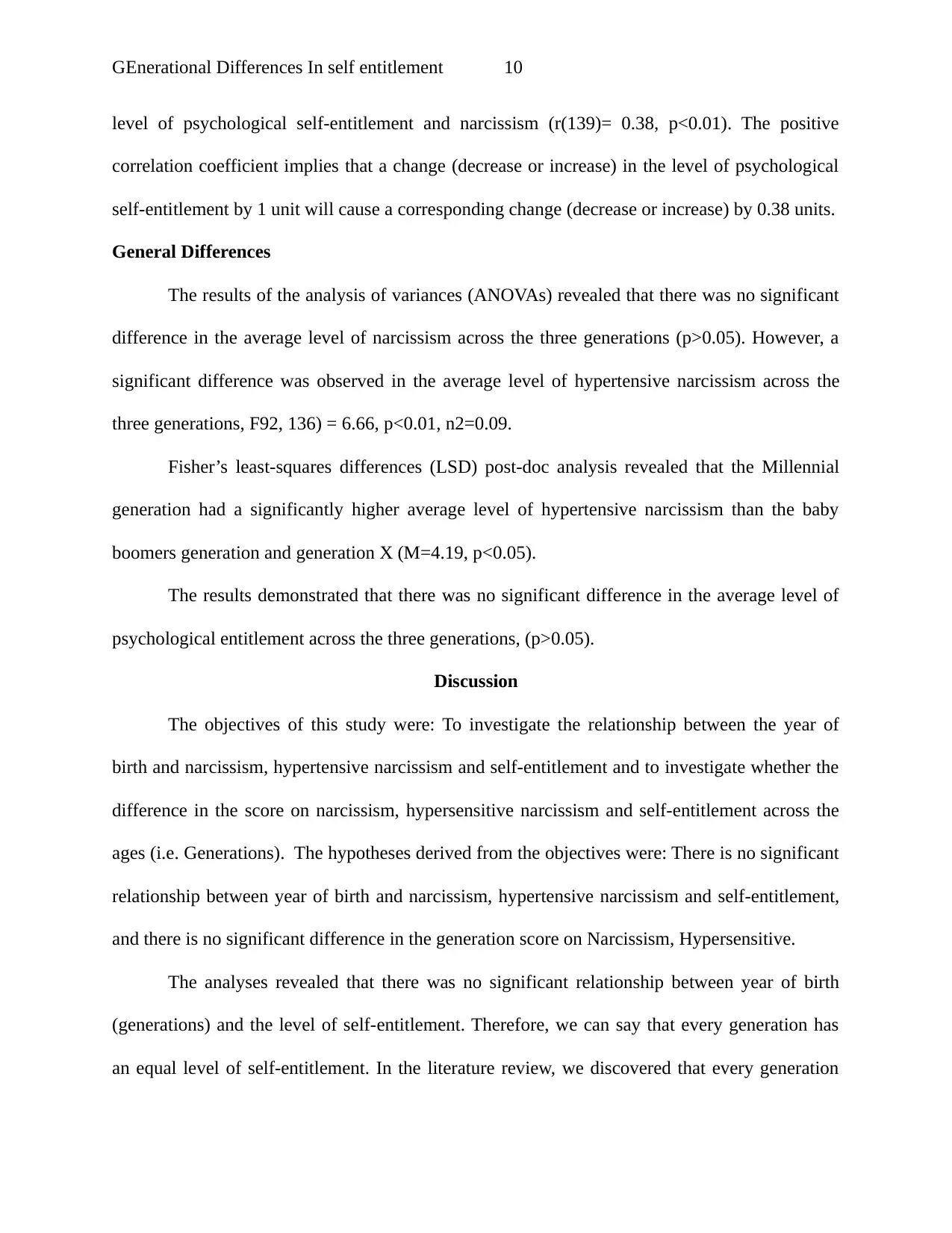
GEnerational Differences In self entitlement 10
level of psychological self-entitlement and narcissism (r(139)= 0.38, p<0.01). The positive
correlation coefficient implies that a change (decrease or increase) in the level of psychological
self-entitlement by 1 unit will cause a corresponding change (decrease or increase) by 0.38 units.
General Differences
The results of the analysis of variances (ANOVAs) revealed that there was no significant
difference in the average level of narcissism across the three generations (p>0.05). However, a
significant difference was observed in the average level of hypertensive narcissism across the
three generations, F92, 136) = 6.66, p<0.01, n2=0.09.
Fisher’s least-squares differences (LSD) post-doc analysis revealed that the Millennial
generation had a significantly higher average level of hypertensive narcissism than the baby
boomers generation and generation X (M=4.19, p<0.05).
The results demonstrated that there was no significant difference in the average level of
psychological entitlement across the three generations, (p>0.05).
Discussion
The objectives of this study were: To investigate the relationship between the year of
birth and narcissism, hypertensive narcissism and self-entitlement and to investigate whether the
difference in the score on narcissism, hypersensitive narcissism and self-entitlement across the
ages (i.e. Generations). The hypotheses derived from the objectives were: There is no significant
relationship between year of birth and narcissism, hypertensive narcissism and self-entitlement,
and there is no significant difference in the generation score on Narcissism, Hypersensitive.
The analyses revealed that there was no significant relationship between year of birth
(generations) and the level of self-entitlement. Therefore, we can say that every generation has
an equal level of self-entitlement. In the literature review, we discovered that every generation
level of psychological self-entitlement and narcissism (r(139)= 0.38, p<0.01). The positive
correlation coefficient implies that a change (decrease or increase) in the level of psychological
self-entitlement by 1 unit will cause a corresponding change (decrease or increase) by 0.38 units.
General Differences
The results of the analysis of variances (ANOVAs) revealed that there was no significant
difference in the average level of narcissism across the three generations (p>0.05). However, a
significant difference was observed in the average level of hypertensive narcissism across the
three generations, F92, 136) = 6.66, p<0.01, n2=0.09.
Fisher’s least-squares differences (LSD) post-doc analysis revealed that the Millennial
generation had a significantly higher average level of hypertensive narcissism than the baby
boomers generation and generation X (M=4.19, p<0.05).
The results demonstrated that there was no significant difference in the average level of
psychological entitlement across the three generations, (p>0.05).
Discussion
The objectives of this study were: To investigate the relationship between the year of
birth and narcissism, hypertensive narcissism and self-entitlement and to investigate whether the
difference in the score on narcissism, hypersensitive narcissism and self-entitlement across the
ages (i.e. Generations). The hypotheses derived from the objectives were: There is no significant
relationship between year of birth and narcissism, hypertensive narcissism and self-entitlement,
and there is no significant difference in the generation score on Narcissism, Hypersensitive.
The analyses revealed that there was no significant relationship between year of birth
(generations) and the level of self-entitlement. Therefore, we can say that every generation has
an equal level of self-entitlement. In the literature review, we discovered that every generation
Paraphrase This Document
Need a fresh take? Get an instant paraphrase of this document with our AI Paraphraser
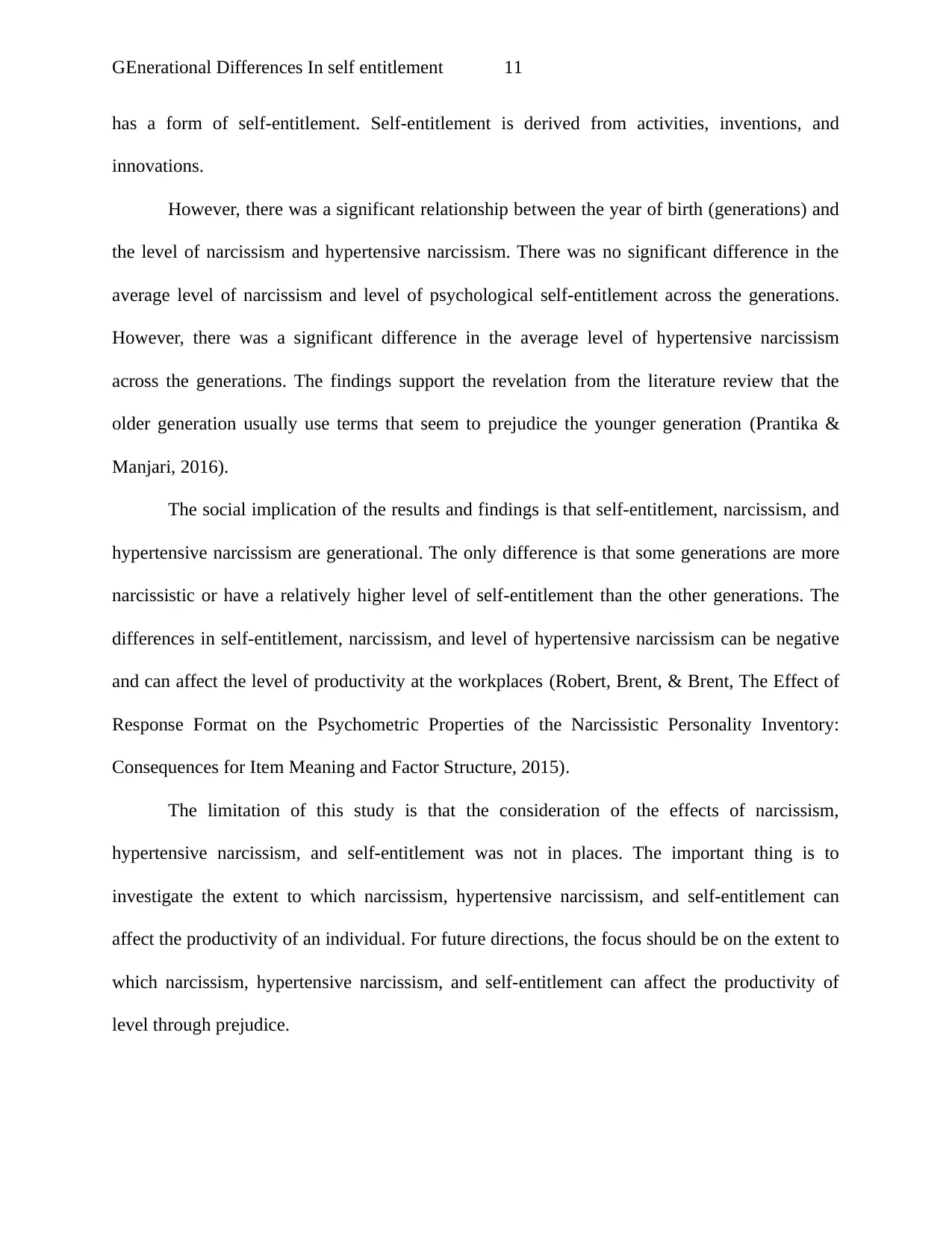
GEnerational Differences In self entitlement 11
has a form of self-entitlement. Self-entitlement is derived from activities, inventions, and
innovations.
However, there was a significant relationship between the year of birth (generations) and
the level of narcissism and hypertensive narcissism. There was no significant difference in the
average level of narcissism and level of psychological self-entitlement across the generations.
However, there was a significant difference in the average level of hypertensive narcissism
across the generations. The findings support the revelation from the literature review that the
older generation usually use terms that seem to prejudice the younger generation (Prantika &
Manjari, 2016).
The social implication of the results and findings is that self-entitlement, narcissism, and
hypertensive narcissism are generational. The only difference is that some generations are more
narcissistic or have a relatively higher level of self-entitlement than the other generations. The
differences in self-entitlement, narcissism, and level of hypertensive narcissism can be negative
and can affect the level of productivity at the workplaces (Robert, Brent, & Brent, The Effect of
Response Format on the Psychometric Properties of the Narcissistic Personality Inventory:
Consequences for Item Meaning and Factor Structure, 2015).
The limitation of this study is that the consideration of the effects of narcissism,
hypertensive narcissism, and self-entitlement was not in places. The important thing is to
investigate the extent to which narcissism, hypertensive narcissism, and self-entitlement can
affect the productivity of an individual. For future directions, the focus should be on the extent to
which narcissism, hypertensive narcissism, and self-entitlement can affect the productivity of
level through prejudice.
has a form of self-entitlement. Self-entitlement is derived from activities, inventions, and
innovations.
However, there was a significant relationship between the year of birth (generations) and
the level of narcissism and hypertensive narcissism. There was no significant difference in the
average level of narcissism and level of psychological self-entitlement across the generations.
However, there was a significant difference in the average level of hypertensive narcissism
across the generations. The findings support the revelation from the literature review that the
older generation usually use terms that seem to prejudice the younger generation (Prantika &
Manjari, 2016).
The social implication of the results and findings is that self-entitlement, narcissism, and
hypertensive narcissism are generational. The only difference is that some generations are more
narcissistic or have a relatively higher level of self-entitlement than the other generations. The
differences in self-entitlement, narcissism, and level of hypertensive narcissism can be negative
and can affect the level of productivity at the workplaces (Robert, Brent, & Brent, The Effect of
Response Format on the Psychometric Properties of the Narcissistic Personality Inventory:
Consequences for Item Meaning and Factor Structure, 2015).
The limitation of this study is that the consideration of the effects of narcissism,
hypertensive narcissism, and self-entitlement was not in places. The important thing is to
investigate the extent to which narcissism, hypertensive narcissism, and self-entitlement can
affect the productivity of an individual. For future directions, the focus should be on the extent to
which narcissism, hypertensive narcissism, and self-entitlement can affect the productivity of
level through prejudice.
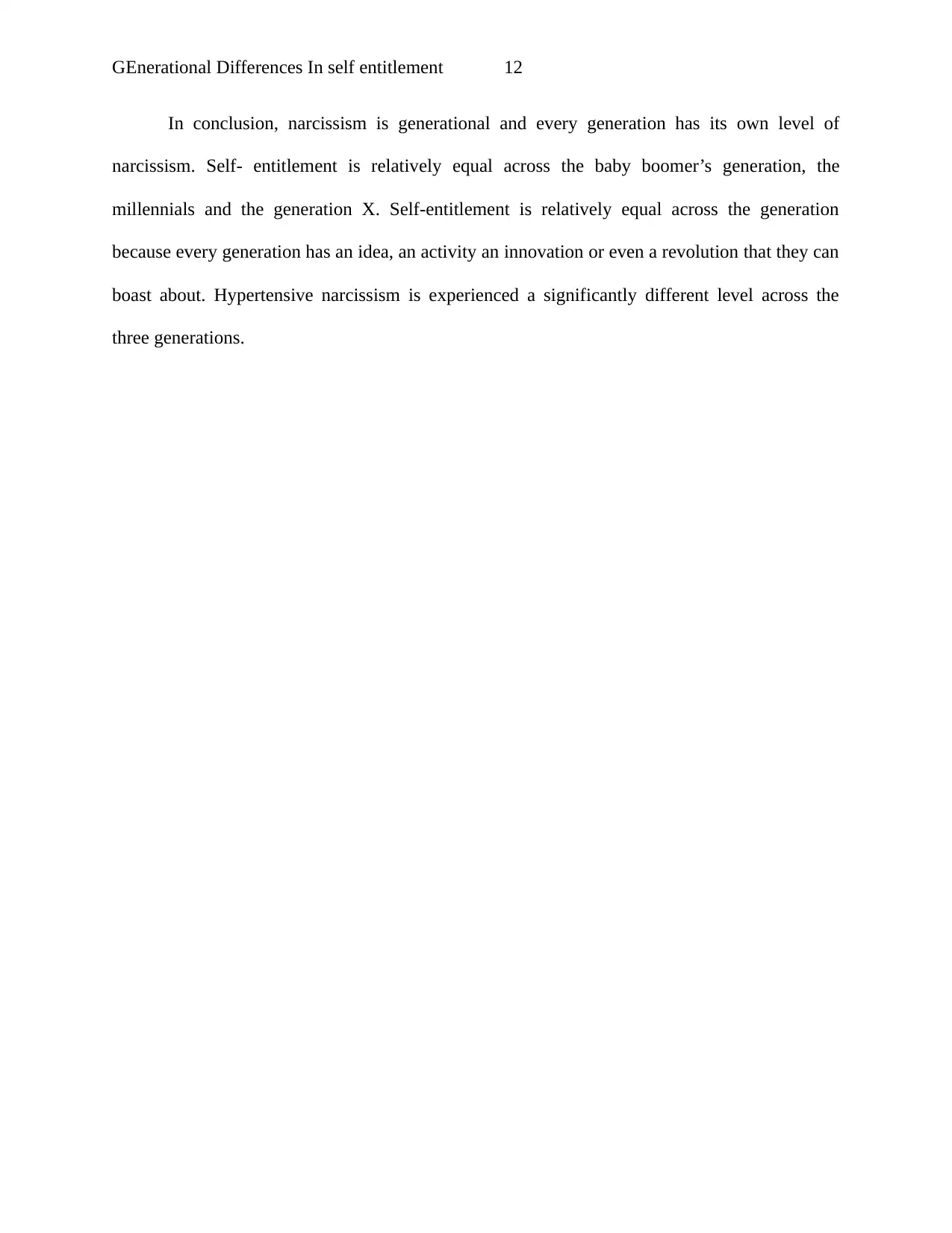
GEnerational Differences In self entitlement 12
In conclusion, narcissism is generational and every generation has its own level of
narcissism. Self- entitlement is relatively equal across the baby boomer’s generation, the
millennials and the generation X. Self-entitlement is relatively equal across the generation
because every generation has an idea, an activity an innovation or even a revolution that they can
boast about. Hypertensive narcissism is experienced a significantly different level across the
three generations.
In conclusion, narcissism is generational and every generation has its own level of
narcissism. Self- entitlement is relatively equal across the baby boomer’s generation, the
millennials and the generation X. Self-entitlement is relatively equal across the generation
because every generation has an idea, an activity an innovation or even a revolution that they can
boast about. Hypertensive narcissism is experienced a significantly different level across the
three generations.
⊘ This is a preview!⊘
Do you want full access?
Subscribe today to unlock all pages.

Trusted by 1+ million students worldwide
1 out of 17
Your All-in-One AI-Powered Toolkit for Academic Success.
+13062052269
info@desklib.com
Available 24*7 on WhatsApp / Email
![[object Object]](/_next/static/media/star-bottom.7253800d.svg)
Unlock your academic potential
Copyright © 2020–2026 A2Z Services. All Rights Reserved. Developed and managed by ZUCOL.


